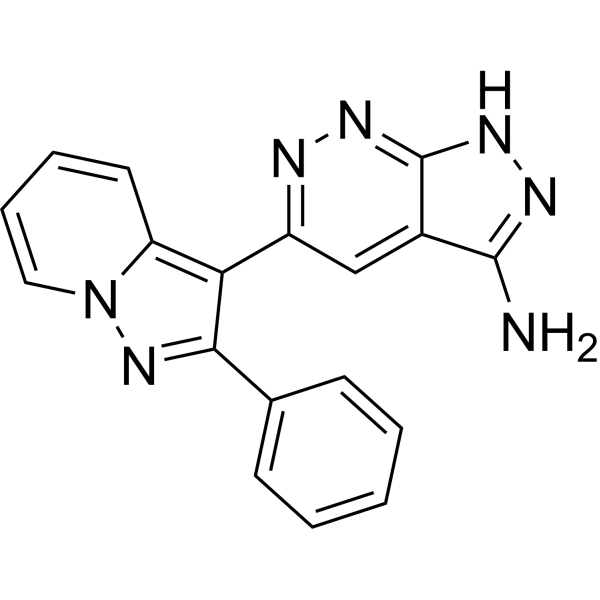Home
Products
FR 180204



| Product Name | FR 180204 |
| Price: | Inquiry |
| Catalog No.: | CN00183 |
| CAS No.: | 865362-74-9 |
| Molecular Formula: | C18H13N7 |
| Molecular Weight: | 327.34 g/mol |
| Purity: | >=98% |
| Type of Compound: | Alkaloids |
| Physical Desc.: | Powder |
| Source: | |
| Solvent: | Chloroform, Dichloromethane, Ethyl Acetate, DMSO, Acetone, etc. |
| SMILES: | Nc1[nH]nc2c1cc(nn2)c1c(nn2c1cccc2)c1ccccc1 |
| Contact us | |
|---|---|
| First Name: | |
| Last Name: | |
| E-mail: | |
| Question: | |
| Description | FR 180204 is an ATP-competitive, selective ERK inhibitor with Ki of 0.31 μM and 0.14 μM for ERK1 and ERK2, respectively. |
| Target | ERK2:0.14 μM (Ki) ERK1:0.31 μM (Ki) |
| In Vitro | In AP-1-transfected cells, FR180204 dose-dependently inhibits AP-1 transactivation with IC50 of 3.1 μM[1]. FR 180204 inhibits spontaneous mesothelioma cell growth[3]. |
| In Vivo | FR180204 (100 mg/kg, i.p., b.i.d.) significantly decreases the severity of symptoms and body weight loss in collagen-induced arthritis mice[2]. In a mouse model of dengue virus (DENV) infection, FR180204 limits hepatocyte apoptosis, reduces DENV-induced liver injury, and improves clinical parameters[4]. |
| Animal Admin | In brief, mice are randomized and grouped by body weight immediately before treatment. Bovine CII is dissolved in 0.1mol/Lacetic acid at the concentration of 10 mg/mL and then emulsified in an equal volume of Freund’s complete adjuvant H37Rv. Apart from a naive group, each mouse is immunized with 25 μL of the CII emulsion into the tail base, followed by a boost injection 3 weeks after primary injection (day 0). FR180204 and methylprednisolone are ground and suspended in 0.1% methylcellulose solution to a volume of 5 mL/kg. Drugs are given by twice daily intraperitoneal injection from days 0 to 12 in accordance with pharmacokinetic studies with superior area under the curve and Cmax values of i.p. versus s.c. or p.o. administration. The initial administration is 30 min before the boost CII injection. The clinical score of arthritis is obtained by summing the visual severity grade of each limb, scored as follows: 0, no arthritis; 1, one swollen digit; 2, two or more swollen digits or swelling of the entire paw without ankylosis; 3, gross swelling with ankylosis of the paw. Body weight is measured on day 12. |
| Density | 1.6±0.1 g/cm3 |
| Exact Mass | 327.123230 |
| PSA | 98.51000 |
| LogP | 0.29 |
| Storage condition | Store at +4°C |